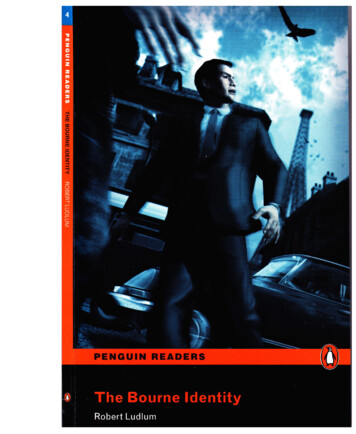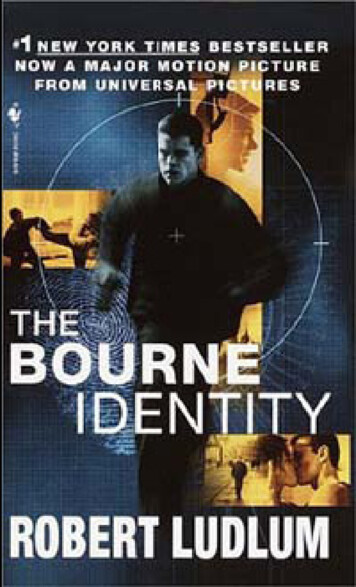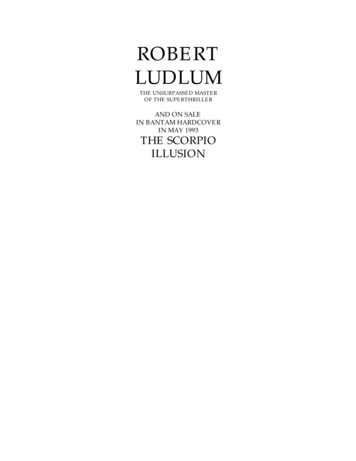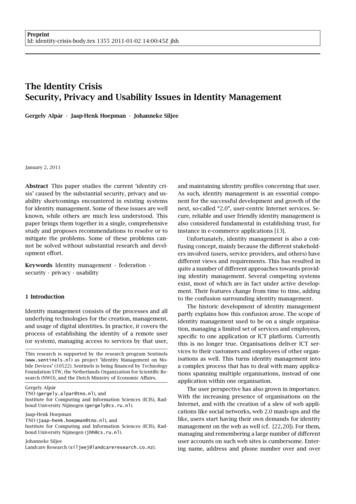
Transcription
The Вошrпе IdentityROBERT LUDLUMRetold Ьу Andy Hopkins andJocelyn PotterSeries Editors: Andy Hopkins andJocelyn Potter
P e a rso n E d u ca tio n L im ite dEdinburgh Gate, Harlow,Essex CM 20 2JE, Englandand Associated Companies throughout the world.ISBN: 978-1-4082-2108-2This edition first published by Pearson Education Ltd 20101 3 5 7 9 10 8 6 4 2O riginal text copyright R obert Ludlum, 1980This edition arranged w ith the O rion Publishing Group Ltd, LondonText copyright Pearson Education Ltd 2010Illustrations by Chris KingSet in 11/14pt BemboPrinted in ChinaSWTC/01The moral rights o f the authors have been asserted in accordance withthe Copyright Designs and Patents Act 1988A ll rights reserved; no part o f this publication may be reproduced, storedin a retrieval system, or transmitted in any form or by any means,electronic, mechanical, photocopying, recording or otherwise, without theprior written permission o f the Publishers.Published by Pearson Education Limited in association withPenguin Books Ltd, and both companies being subsidiaries o f Pearson PLCFor a complete list of the titles available in the Penguin Readers series please write to your localPearson Longman office or to: Penguin Readers Marketing Department, Pearson Education,Edinburgh Gate, Harlow, Essex CM20 2JE, England.
ContentsIntroductionChapter 1 The M an w ith no M em oryChapter 2 Names and AddressesChapter 3 Trained to KillChapter 4 Following the M oneyChapter 5 The M an is CainChapter 6 MessagesChapter 7 Treadstone Seventy-oneChapter 8 At H om e w ith the GeneralChapter 9 Trouble at Les ClassiquesChapter 10 Friends or Enemies?Chapter 11 R ebirthActivitiespageV1614223038434954616571
IntroductionIt happened so quickly that there was no time to think. A man walkedinto him and then his eyes widened in disbelief.“N o! M y God! It cannot . You’re dead!”The patient’s hand seized his shoulder.“I lived. W hat do youknow?”W hen Dr. W ashburn’s patient is pulled from the waters o f theM editerranean, he has been shot many times and is close todeath. The doctor discovers that the m an’s face has been changedand that he has lost his mem ory— maybe forever. W ho is thepatient? W hat is he? A nd w hat was he before the attack in whichhe almost lost his life?The patient him self has no idea w ho he is. He has knowledgeand skills, but they are not the knowledge and skills o f anordinary man. W hy is he so comfortable w ith guns? W hy isthe num ber o f a bank account recorded on a small piece o f filmw hich was hidden under his skin? W hy does he know so m uchabout im portant world events but not his ow n name?As he begins the search for his identity, the patient is seriouslyworried. H e soon realizes that a lot of people are glad that he isdead. Then, w hen they learn that he is alive, they want to killhim . But why? W hat is hidden in the patient’s past? And doeshe have a future?The Bourne Identity is one of a num ber of very popular storiesabout the m an w ho has lost his memory. The Bourne Identity, TheBourne Supremacy, and The Bourne Ultimatum are all bestsellingbooks w hich have also been made into successful movies starringM att Dam on.The movie stories are different in many ways, though, fromv
the stories of the books that they come from. The m ain characterin the movie o f The Bourne Identity, for example, has a differentlevel o f responsibility for the world o f killing that he lives in.The story of Carlos the Jackal is also very im portant in Ludlum ’sbook, but was removed for the film.In this book, Carlos is one of m any people and organizationswho would like the hero to be dead. His character here isLudlum ’s invention, but a real assassin called Carlos the Jackal—the Venezuelan-born terrorist Ilich R am irez Sanchez, describedin the newspaper report at the beginning o f this book— is in factnow being punished for his crimes in a French prison.This use o f real but fictionalized people and of actual eventsin international politics is typical o f Ludlum ’s w riting, and it isone of the qualities that makes his stories so exciting. Againstthe background o f big events, his heroes must fight againstpowerful national and international organizations, oftengovernmental and financial. Terrorists are usually the tools ofthese organizations, employed for their skills as killers— they arenot people w ith strong political or personal beliefs.Ludlum ’s heroes are lonely and confused. They do not knowwho their true friends are or who their enemies m ight be. Theaction moves from country to country. It is often violent andalways very fast. From the first page, the reader wants to knowmore. M illions o f readers have discovered that it is very difficultto put a R obert Ludlum book down before the end.R obert Ludlum, the w riter of The Bourne Identity, was born inN ew York City in 1927 and grew up in N ew Jersey. He enjoyedacting and football at school, but became a soldier in 1945 beforegoing to college. He then worked as an actor on stage and ontelevision, and he produced many stage plays. This experienceof theater, he said in later interviews, taught him how to keepthe interest o f his readers.VI
Ludlum ’s first book, The Scarlatti Inheritance, appeared in1971, and it became an im m ediate bestseller. D uring W orldW ar 2, officials in W ashington hear that a top Nazi com m anderis prepared to share secrets which w ill shorten the war— but atthe same tim e, equally secret inform ation about the Scarlattiinheritance w ill become know n and w ill destroy m any W esternpublic figures. Ludlum ’s next book, The Osterman Weekend(1973), was made into a movie. In the story, a news show hostis told by a CIA officer that some o f his friends are a danger tothe nation and the world— but which o f them are really enemiesand which are true friends?From the mid-1970s, Ludlum was a very successfulfull-tim e writer. He and his family moved from N ew Jersey toa farmhouse in Long Island, and had a second hom e in Florida.R obert Ludlum died in 2001, but other books have appearedin his name since then, including more Bourne books. Someof these were w ritten or part-w ritten by Ludlum; others aresimilar works by other writers. Ludlum did not want his nameto be forgotten after his death.It was not likely that he would be forgotten, though. M orethan 200 m illion copies o f his books have been sold, and therehave been translations into thirty-tw o languages. R obertLudlum ’s exciting stories are adm ired and enjoyed by readersaround the world.
B“M y name is Geoffrey Washburn. W h a t’s yours?”“I don’t- know,” he said.
Hunt for assassinJuly 7, 1975A worldwide search has begun for an assassin after a Lebaneseinformant led two police officers to an apartment in Paris, whereall three men were killed. The killer is known as Carlos, but he isbelieved to be llich Ramirez Sanchez, the name on one of fourpassports found at the apartment. Guns, notebooks, and “deathlists” were also discovered. Carlos has been connected withterrorist organizations in Japan, North Africa, Germany, Canada,Turkey, France, Spain, and Northern Ireland.C hapter 1 T he M an w ith no M em ory“W h o’s there? W ho’s in this room ?”W ashburn w ent quietly to the bed. H e did not w ant tomake a sudden noise or movement that could cause his patientnew psychological damage. The next few minutes would beas im portant as the surgery that he had perform ed on the manmany times during the past m onth.“A friend,” he said softly. “You speak English. I thought youwould. H ow do you feel?”“I’m not sure.”“You were brought here, to the French island of Ile de PortNoir, by fisherm en w ho found you in the M editerranean. You’dbeen shot, m any times. I’m a doctor — your doctor. M y name isGeoffrey W ashburn. W hat’s yours?”The stranger was silent for a m inute. T hen he turned andlooked into the doctor’s eyes. “I don’t know,” he said.Weeks passed.“It w ill take time. D on’t fight it.”“You’re drunk,” his patient said.“I usually am,” W ashburn agreed. “T hat’s why I lost my job1
in a London hospital and came here. But I’m a good doctor,and I saved your life. I’ve watched you, and I’ve listened to you.You speak English, French, and an Asian language— I don’tknow which one. You’ve been violent— at times I’ve had to tieyou to the bed to protect your wounds. A nd your face reallyinterests me.”“Tell me.”“It’s been changed. You’ve had surgery to every part o f it—eyes, nose, chin. And your hair is not your natural color.”The stranger thought about this. “But why?” he said.“Think! W hat are you? W hat were you?”“An international salesman? A teacher o f languages?”“N o,” said W ashburn. “Your body is strong. Your hands arestrong. But you’re not a builder or a fisherm an— you have agood m ind and w ide knowledge. W hen you were unconscious,you talked o f places that I’ve never heard of.”“W hat else have you learned about me?”“I had to be sure that your m ind was strong enough to acceptthis.” W ashburn held up a small square o f plastic. “I found thispiece o f film under your skin. It says: Die Bank Gemeinschaft, 11Bahnhofstrasse, Zurich. 07-1712-0-14-260.”“Bank details?”“Exactly The numbers are in your handw riting— they’reyour signature for an account at a bank in Zurich.”M ore tim e passed.“There are no rules,” the doctor told him . “Amnesia can bephysical— from a head w ound— or psychological. I think, foryou, it’s both. Your m ind is protecting itself. But w e’re m akingprogress. W e’re finding out what you do best.” He opened acloset and took out a gun. “Take this to pieces.” He threw it tothe other man.The patient looked at the gun. T hen his fingers startedmoving, and in seconds the gun was in pieces.2
“You see? You have experience— a lot o f experience— o f guns.You’re a professional, but not, I believe, a soldier. I’m thinking ofthe surgery to your face. Your skills, and your norm al behavior,will slowly come back to you. But your physical brain is notwhat it was. I don’t know if it w ill ever connect those skills w ithyour past. Your memories have been destroyed.”The man sat silently. Then he said, “The answer’s in Zurich.”“Yes, you’re strong enough now. I’ve made arrangements.T here’s a boat here from Marseilles. The captain will leave youon a beach outside the city.”The m an w ith no m em ory looked at him . “So it’s tim e.”“It’s time. I know w hat you’re feeling. A sense o f helplessnessbecause until now I’ve been your guide. But you’re not helpless,believe me. You will find your way.”“To Zurich.”“To Zurich,” agreed the doctor. “H ere— take this. Twothousand francs*— all that I have. And my passport. W e’re aboutthe same age, and it’s eight years old. People change.”“W hat w ill you do?”“I won’t need it if I don’t hear from you. If I do, you’ll help meleave here— not just w ith money, but in ways you can’t imagine.”“You’re a good m an.”“I think you are, too— as I’ve know n you. I didn’t know youbefore. I can’t judge the m an you were.” There were no lights on the French coast. The captain pointedto a small beach.“W e can’t go closer. You’ll have to swim from here.”* francs: old French money, used before the change to euros; at that tim e thevalue o f 2,000 francs was about 500 A m erican dollars. Swiss francs are stillused in Switzerland.3
“T hank you for helping me.”“D on’t thank me. W hen you were brought in from the storm,three of my m en were also hurt, on my boat. The doctor helpedthem . I had no fish, so no money. You’re my paym ent.”“I need papers,” the m an said, sensing that more help waspossible. “I need a passport to be changed.”The captain was silent. Then he said, “I’ll be in a cafe in Marseillesthis evening, Le Bouc de Mer. You’ll need money for the papers.”“H ow much?”“T hat’s a m atter for the m an you’ll speak to there. A lot.”The patient thought about the m oney from the doctor. Itw ouldn’t be enough. “I’ll be there,” he said.Some time later, he walked through the narrow streets of thesmall coastal town. Money. H e found the richest area.In a store, he heard a conversation betw een the ow ner anda customer.“W here’s the Marquis* today?”“D runk, in the apartm ent above the cafe next door. W aitingfor a wom an. I had to drive him from the house w ithout hiswife seeing him . I’ve left his car here, but he w on’t be able todrive it. I’ll come back later.”The patient walked around the next-door building, lookingthrough doors and w indows and w ondering w hich car belongedto the Marquis.A w om an arrived— an attractive w om an in a very shortskirt— and soon he saw her at an upstairs window. The patientw ent inside, took the stairs to the first floor and, in one quickmovement, broke the door down.“Nom de Dieu t !” The man on the bed looked up in shock.“Did my wife hire you? I’ll pay you more!”* Marquis: the title o f an upper-class m an in Francet Nom de Dieu!: In God’s name!, French words spoken in surprise4
“Keep quiet,” said the patient, “and you w on’t get hurt.”He quickly put on the M arquis’s expensive clothes and tookhis money, watch, and car keys.“Please leave me your clothes,” the M arquis cried.“I’m sorry. I can’t do that.” He picked up his ow n and thew om an’s clothes. Then he noticed a telephone on a desk by thew indow and pulled the wire from the wall.“The police w ill find you,” the M arquis said angrily.“I don’t think you’ll report a crime. H ow will you explain itto your wife?”You’re not helpless. You will fin d your way. W hat kind o f pastproduced the skills that were returning to him now?He had difficulty w ith the controls in the M arquis’s Jaguar.He had, he thought, no past experience w ith cars like this. Hefollowed the signs to Marseilles, and found a garage selling newand used expensive cars. Ten minutes later, he had exchangedthe car for six thousand francs— about a fifth of its value, butno questions asked. Soon after that, he had sold the watch andbought clothes and a soft leather suitcase. T hen he found a hoteland rested until it was time for his appointm ent at Le Boucde Mer.The patient made his way through the crowded tables o f thecafe until he found the captain. There was another man at thetable, thin and pale-faced w ith narrow eyes.“H ow m uch to change this passport— by ten o’clocktom orrow ?”“Three and a half thousand francs. And I’ll need a photo.”“I had one done on the way here.” The patient passed it to him.A m eeting was arranged for the next day, and the captainwas given five hundred francs under the table. Then the patientwalked tow ard the door.It happened so quickly that there was no tim e to think. Am an walked into him and then his eyes widened in disbelief.5
“No! My God! It cannot . You’re deadl”The patient’s hand seized his shoulder. “I lived. W hat do youknow ?”The other man’s face was red and angry. He pulled out aknife. “I’ll finish it now,” he said.The man with no memory brought his other hand down,hard, and kicked with all his strength. His attacker fell back andthe knife was seen by the people around them.“Take your argument outside, or we’ll call the police!”The patient could not move in the crowd. His attacker ran,holding his stomach, out into the darkness of the street.He thought I was dead—wanted me to be dead. And now he knowsI ’m alive.Chapter 2 Nam es and AddressesHe knew the name of the hotel. Carillon du Lac. He had givenit to the taxi driver without thinking. He knew the receptionarea, and the big glass windows that looked out over LakeZurich. He had been there before.“It’s good to see you again, sir,” the receptionist said.But I don’t know you! I don’t know me/ Help me! Please!“Thank you,” he said. “I’ve hurt my hand. Could you fill in theform for me and then I’ll try to sign it.” The patient held his breath.“O f course, sir.” The receptionist completed the form, thenturned it around for the signature.MrJ. Bourne, New York, N.Y., U.S.A.He stared at it. He had a name—part of a name. J. Bourne.John? James? Joseph? He signed.The receptionist bent forward. “The usual conditions, sir?You will be informed of any calls or visitors, but only calls fromyour company should be put straight through to your room.6
Treadstone Seventy-one, if I remember correctly.”More information! Another name! He had a country, and a city,and a company that employed him— or that had employed him.And he was protected from unwanted visitors.“That’s correct. Thank you.”Upstairs in his room, he called the New York operator. Herwords were quite clear. “We have no telephone number for acompany of that name, sir.”He put the phone down. Might Treadstone Seventy-one bea code, a way of reaching Mr. J. Bourne of New York City?He left his room and walked into the street. His feet seemedto take him on a route that he knew— and then there was theGemeinschaft Bank.He entered through the heavy glass doors and was directed toa first floor receptionist.“Your signature, please,” the man requested, passing him a form.He looked and understood; no name was needed this time,just the number of the account. He wrote out the numbers andwas shown to a private room.“The door will lock behind you,” the receptionist told him.“It is usual for holders of special accounts to telephone beforethey come.”“I knew that,” Washburn’s patient lied, “but I’m in a hurry.”He walked inside, heard the door lock, sat down, and waited.Finally another, metal door opened. A bank officer introducedhimself as Herr* Apfel and invited the visitor into his office.The “signature” was requested again, and within minutes thereceptionist entered with a black metal container.“May I unlock the box?” Herr Apfel asked.“Please do— open it.”The banker looked shocked. “I said ‘unlock,’ not ‘open.’ Your* Herr: the Germ an word for Mr.7
identity might be listed, and I do not need to know it.”“But if I wanted the money to be sent to another bank?”“Then a name would be needed.”“Open it.”The banker opened the box and passed the papers to theother man, who stared at the top page in disbelief. The amountin the account was 11,850,000 Swiss francs. More than 4 millionAmerican dollars. How? W hy?The bottom statement showed that the first payment into theaccount had been from Singapore: 5,175,000 Swiss francs. Belowthat was an envelope with “Owner only, officer of the TreadstoneSeventy-one Company” typed on it. He opened it, and read:Owner: Jason Charles BourneAddress: UnlistedNationality: AmericanJason. He felt a pain in his stomach, a ringing sound in hisears. W hy did he feel that he was falling into darkness again?When he returned to the reception area an hour later, after ameeting with another bank official, Herr Koenig, 3,000,000 Swissfrancs had been sent to the Marseilles account of Dr. GeoffreyWashburn, who had saved his life. The money would cure orkill the alcoholic. Four million francs was on its way to a bank inParis, for the use of Jason C. Bourne. Another 100,000 francs inlarge notes had been handed over by Herr Koenig in cash.Herr Koenig walked with him to the elevator, past two menwho were sitting at opposite ends of the room. Out of the cornerof his eye, Bourne noticed movement. Koenig had turned toboth of the men. One took a radio out of his pocket and spokeinto it. The other took out a gun. The men moved towardBourne, who was forced to back into the empty elevator.As the elevator doors closed, with the gun at his head, Bournemoved suddenly to the right, then swept his foot off the floorand up to the man’s arm, knocking the gun from his hand. His
body continued to turn and his shoulder crashed into the otherman’s stomach, throwing him against the wall. The man fell tothe floor, unconscious.The man at Le Bouc de Mer, Bourne knew, had wasted notime sending his message to Zurich. Kill him! He seized theother killer by his neck. “How many? How many are waitingdownstairs?” No answer. He pushed the man’s face into theelevator wall, opened his coat, and found another gun. Hepointed it. “How many?”“Two. One by the elevators. One by the car outside.”“W hat kind of car?”“A Peugeot. Brown.”The elevator doors opened and a man in a dark coat wearinggold glasses stepped forward, recognized the situation, andpointed a silenced gun at Bourne.Bourne quickly pushed his prisoner out in front of him,protecting himself from the gun. Shots were fired, peoplescreamed for the police. His prisoner fell to the floor. Bourneseized the nearest person, the receptionist, threw him into thepath of the man with the gold glasses, and ran through the doors.Then he slowed down and walked calmly away, past the man inthe Peugeot, before he turned and watched.As the first police car arrived, the man in gold glasses talkedto the driver of the Peugeot. Then, unexpectedly, he returnedto the bank, joining the police who were racing inside.The Peugeot left and an ambulance arrived. Bourne turnedaway. He had to get to his hotel, pack, and leave Zurich—leaveSwitzerland. For Paris. W hy Paris? Inside the bank, there hadseemed to be no question. He had to go to Paris. But why?At the Carillon du Lac, Bourne packed quickly and then starteddown again. There were three other guests in the elevator—twomen and a red-haired woman. French-speaking Canadians, Bournerealized, and clearly at the hotel for a conference. As he followed9
them to the reception desk, he noticed a sign on the wall:Welcome to members oj the Sixth World Economic ConferenceThe w om an was now speaking English to the receptionist.“Dr. St. Jacques?” the man checked, and passed her an envelope.Bourne moved toward the entrance, then stopped. A brow nPeugeot was parked in the street outside, and the m an w ith goldglasses was clim bing out of the car. From another door, a secondman appeared, w earing a raincoat w ith pockets that were wideenough for powerful guns.How? H ow had they found him? T hen he rem em bered andhe felt sick. It had seemed so innocent at the time.“Are you enjoying your stay in Zurich?” Herr Apfel had asked.“Very much. My room looks out onto the lake. Very peaceful.”H ow m any hotels looked out onto the lake? Two? Three?The names o f the hotels came into his m ind— from where?They had seen him . But did they think they could walk intoa crowded hotel and simply kill him? O f course they did. W ithsilencers on their guns and people all around him , they couldeasily escape before they were identified. W hat made themthink he w ould not scream for the police? And then the answerwas clear. They knew that Jason B ourne could not expect policeprotection. W hy?He turned and saw the red-haired wom an, still reading hermessage. He looked back at the entrance. The killers werem oving through the crowd toward him . Bourne walked quicklytoward the wom an, seized her by the arm, and pulled her awayfrom the reception desk. As she looked up at him in surprise, heshowed her the end of the gun in his pocket.“I don’t w ant to frighten you,” he said quietly, “but I have nochoice. Take me to your conference room .”Surprise had turned to shock. “You can’t .”“Yes, I can.” Unseen by the people around them , he pushedthe gun into her side. “Let’s go.”10
“I don’t want to frighten you, but I have no choice.”
Pale and shaking, she led him quickly to a large hall where aman was giving a talk.“I’ll scream,” the w om an whispered.“I’ll shoot,” he promised.He pushed her across the back of the hall and dow n towardthe front. Heads turned in their direction. The speaker pausedand then came three sharp, sudden sounds. Shots! Then screams.R unning now, Bourne pulled the w om an toward a door at theback of the stage, and out.They were in a car park. He heard a m etallic sound, saw aslight movement. A nother killer. H ow did they know where tofind him? Radios again, o f course. He moved quickly to oneside, his shoulder crashing into the w om an’s stomach, sendingher to the ground. Shots hit cars near them. H e jum ped up, gunin hand, and fired three shots before throw ing him self down.He heard a scream— and then nothing. H e started to get up,but could not. Pain spread through his body, through all theplaces where his wounds had been.He looked over at the wom an, who was slowly getting toher feet. He could not let her go! He had to stop her! He slowlymade his way across the ground toward her.“Help me up!” he said, hearing the pain in his voice.“You’re j oking! ”“This gun is aimed at your face, Doctor. Help me up.”W hen he, too, was on his feet, he pulled the dead driver fromthe car and ordered the w om an to get behind the wheel.“Drive!” he said, climbing into the passenger seat.W here could he go? The killers had seen his suitcase. Theywould watch the stations and the airports. But he had money— alot o f money. And he had to get to Paris.“I w ork for the Canadian governm ent,” the w om an saidquickly. “I’m an economist. They expect me to contact themtonight. If they don’t hear from me, they’ll call the police.”12
Bourne took her bag and looked through it. Keys, money, herpassport: Dr. M arie St. Jacques. And the message that was givento her at reception. A message allowing her vacation time.As they drove across Zurich, stopping only to leave the carand steal another one, Bourne was following a memory. Arestaurant— he knew it was im portant. He knew the way, butwhat was it called? Drei Alpenhauser— yes! He had to go there.Even before they parked, he had noticed that she was tooquiet, too obedient. W hen they came to a stop, her door crashedopen. She was half-way out into the street before Bourne’s armshot out and seized the back of her dress, forcing her back intothe car. He took her hair and pulled her head toward him .“I w on’t do it again,” she cried. “I promise I w on’t.”“You w ill,” he said quietly, “but if you run away before I letyou go, I’ll have to kill you. I don’t w ant to, but I’ll have to.”“You say you’ll let me go,” she said. “W hen?”“In an hour or two. W hen we’re out of Zurich and I’m on myway to somewhere else. N ow dry your eyes. W e’re going inside.”“W hat’s in there?”He looked at the wide brow n eyes that were searching his. “Idon’t know,” he replied.He showed her the gun— a reminder— and they entered the bar.He had seen the inside of the Drei Alpenhauser before. Herecognized the heavy w ooden tables, the lighting, the sounds.He had come here in another life.A waiter led them to a table, where they ordered a drink. Bournelooked around. And then he saw a face across the room— a largehead above a fat body. Bourne did not know the face, which wasshowing fear and disbelief—but the face knew him.The fat m an walked uncom fortably over to their table.“W hy are you here?” he asked. “I did what I was told to do.I gave you the envelope. I told no one about you. Have othersspoken? I saw the police offer o f a reward for inform ation about13
you, but I did nothing. The police have not come to me. If theydid— you know — others would follow. M y wife, my children .I’ve said nothing — done nothing!”“Has anyone else? Tell me. I’ll know if you’re lying.”“Chernak is the only contact of yours that I know. He passed methe envelope— you know that. But he w ouldn’t say anything.”“W here is he now?”“W here he always is. In his apartm ent on Lowenstrasse.”“W hat num ber?”“You’re testing me!” The fat man stared at him in fear. “37.”“Yes, I’m testing you. W ho gave the envelope to Chernak?W hat was in it?”“I have no idea who gave it to him . In it? Money, I guess. Alot of money. N ow please, let me go! Get out o f here!”“One more question,” Bourne said. “W hat was the money for?”The fat man was shaking now. “N o one told me, but everyday I read the newspapers. Six months ago, a m an was killed.”C hapter 3 Trained to K illThey followed directions to Lowenstrasse. Marie was silent now,holding the wheel tightly. Bourne watched her and understood.A man was killed . Jason Bourne had been paid to kill. Thepolice had offered a reward. Others would follow. How many peoplewere looking for him? W ho were they? W hen would this end?“T here’s num ber 37,” he said. “Stop the car!”M arie looked at him w ith fear in her eyes. “I don’t w ant to goin there w ith you. I heard what the m an said in the restaurant.If I hear any more, you’ll kill me.”Bourne pulled his aching body out o f the car. “His wordsmade no more sense to me than to you. M aybe less.” H e saw theconfusion on her face. “Let’s go.”14
He did not press the bell below C hernak’s nam e— hepressed others until someone opened the door. H e walked w ithdifficulty up the stairs, holding M arie’s arm, and on his ordersshe knocked and then called out to the m an inside.The door opened and there, in a wheelchair, was a m an w ithno legs.“You’re crazy!” the m an cried. “Get away from here!”“I’m tired o f hearing that,” Bourne said, and pulled M arieinside.She willingly obeyed his orders to go to a small, windowlessbedroom , and then Bourne turned back to Chernak.“You promised that our last piece of business would be the finalone,” Chernak shouted, white-faced. “This is too dangerous.”“The envelope that you passed to our friend at the DreiAlpenhauser,” Bourne said. “W ho gave it to you?”“A messenger, like all the others. I don’t know. You werepaid, so I know you accepted the job. W hy are you here now?”Because I have to knoiv. Because I don’t understand. Help me!He suddenly noticed C hernak’s hand m oving toward a baghanging from his chair. The hand came out quickly, pointinga gun, and before Bourne could reach his own, Chernak firedtwice. Pain filled B ourne’s head and shoulder as he dived to oneside, then crashed his other shoulder into C hernak’s wheelchair.The legless m an fell helplessly to the floor.“T hey’ll pay for your corpse!” he screamed. “Carlos will pay!I’ll see you in hell.”Bourne fired a bullet into the m an’s head.A long, terrible cry came from the bedroom door. A w om an’scry. Bourne could hardly think for the pain. He had to takeher— w hat was her name?— and get out.“M y God, you killed him !” she screamed, as he pulled herout o f the apartm ent. “A m an w ith no .Inside t
to put a Robert Ludlum book down before the end. Robert Ludlum, the writer of The Bourne Identity, was born in New York City in 1927 and grew up in New Jersey. He enjoyed acting and football at school, but became a soldier in 1945 before going to college. He then worked as an actor on s










